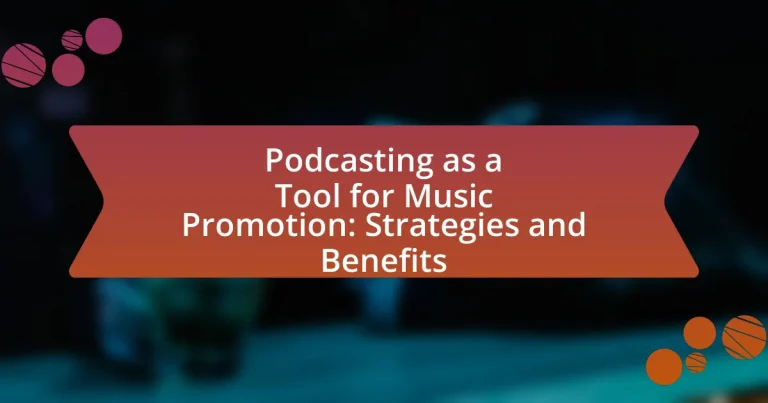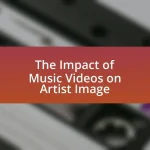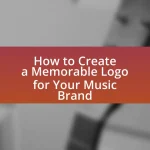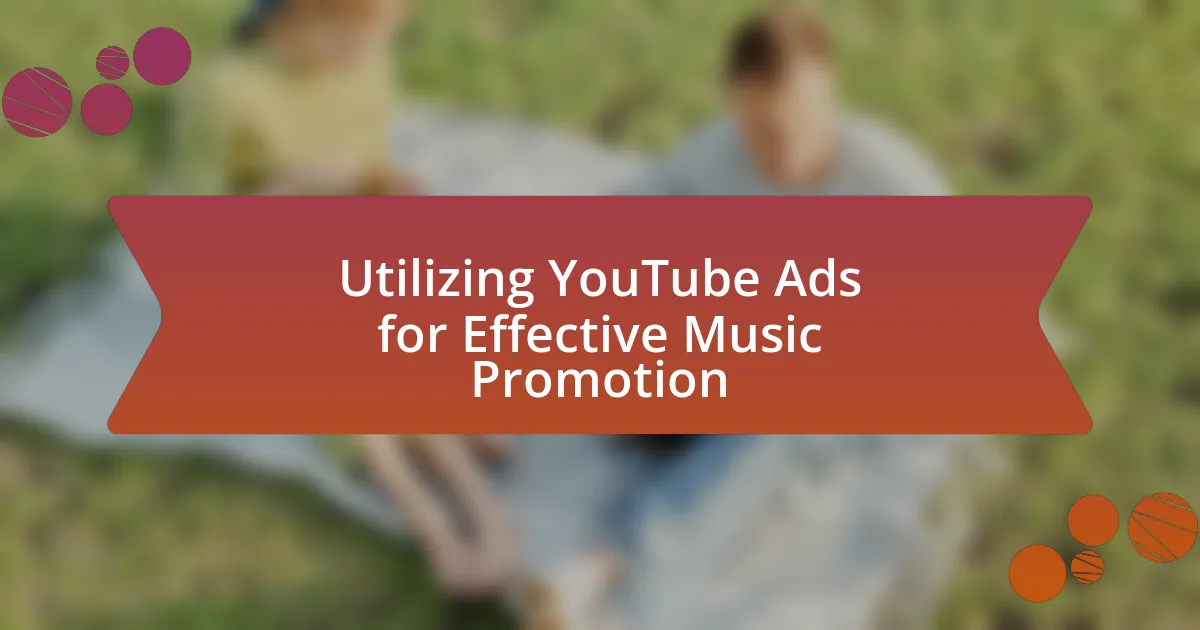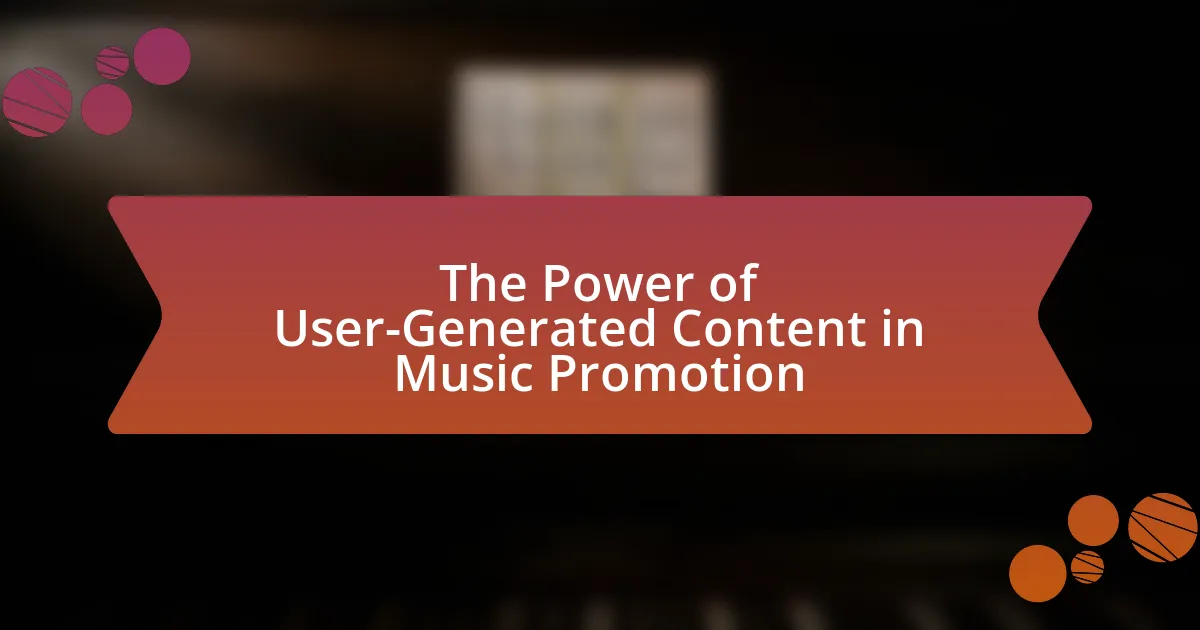Podcasting serves as a powerful tool for music promotion, enabling artists to connect with audiences through engaging content such as interviews, music reviews, and personal stories. With 41% of Americans aged 12 and older listening to podcasts monthly, musicians can leverage this growing medium to enhance visibility, foster audience loyalty, and drive music sales. Key benefits of podcasting include direct audience engagement, storytelling opportunities, and networking potential, which collectively contribute to a musician’s brand development and promotional strategies. The article explores effective strategies for musicians to utilize podcasts, including guest appearances, content creation, and audience interaction, while also highlighting common pitfalls to avoid in their promotional efforts.
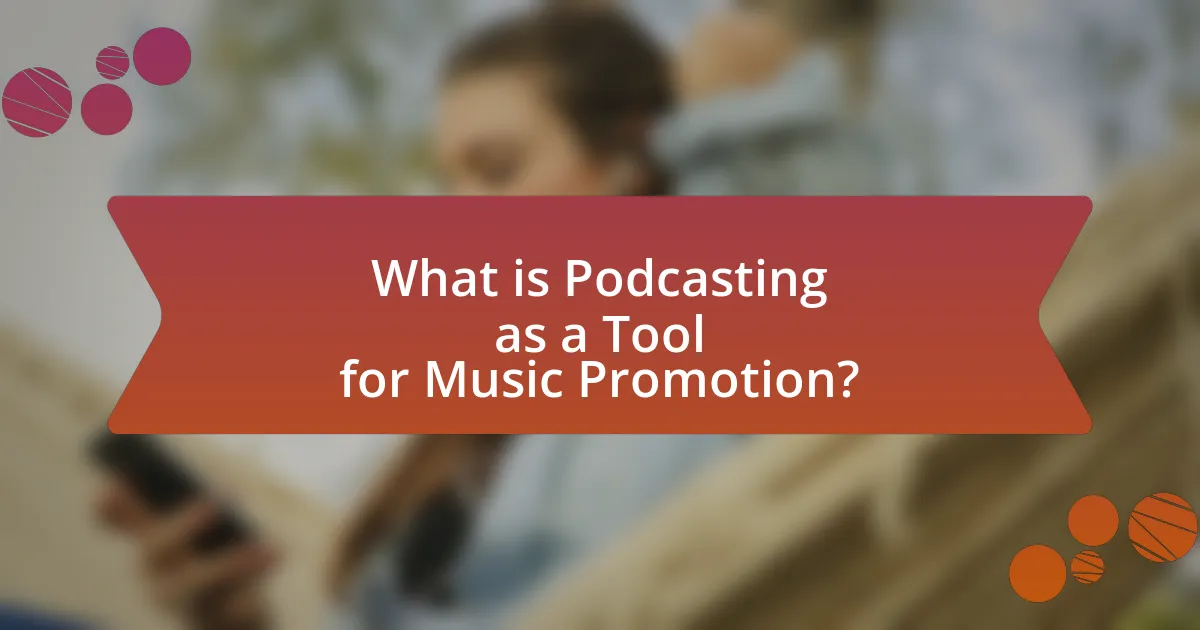
What is Podcasting as a Tool for Music Promotion?
Podcasting is a digital audio medium that artists and music promoters use to reach audiences and promote music effectively. By creating engaging content, such as interviews, music reviews, or behind-the-scenes stories, musicians can connect with listeners on a personal level, fostering a loyal fan base. According to a 2021 report by Edison Research, 41% of Americans aged 12 and older have listened to a podcast in the past month, indicating a growing audience for this medium. This wide reach allows musicians to showcase their work, share their journey, and engage with fans, ultimately enhancing their visibility and driving music sales.
How does podcasting serve as a platform for music promotion?
Podcasting serves as a platform for music promotion by providing artists with a direct channel to engage with their audience through storytelling and music sharing. This medium allows musicians to showcase their work, discuss their creative process, and connect with fans on a personal level, which can enhance listener loyalty. According to a 2021 report by Edison Research, 41% of Americans aged 12 and older have listened to a podcast in the past month, indicating a growing audience that artists can tap into for exposure. Additionally, podcasts often feature music tracks, interviews, and discussions about new releases, which can drive traffic to streaming platforms and increase sales.
What are the key features of podcasts that benefit musicians?
Podcasts benefit musicians through features such as audience engagement, storytelling, and networking opportunities. Audience engagement allows musicians to connect directly with listeners, fostering a loyal fan base. Storytelling enables musicians to share their creative processes, personal experiences, and insights, which can enhance listener connection and interest in their music. Networking opportunities arise from collaborations with other podcasters and musicians, expanding their reach and visibility in the industry. These features collectively enhance musicians’ promotional strategies and contribute to their overall success.
How does audience engagement in podcasts enhance music promotion?
Audience engagement in podcasts enhances music promotion by creating a direct connection between artists and listeners, fostering loyalty and interest in the music. Engaged audiences are more likely to share content, attend live events, and purchase music, which amplifies an artist’s reach. For instance, a study by Edison Research found that 54% of podcast listeners are more likely to consider brands or artists mentioned in podcasts, indicating that engaged listeners actively respond to promotional content. This interaction not only increases visibility for the music but also builds a community around the artist, leading to sustained support and growth in their fan base.
Why is podcasting becoming increasingly popular among musicians?
Podcasting is becoming increasingly popular among musicians because it provides a direct platform for engagement with fans and the opportunity to share their stories and music in a personal format. This medium allows artists to build a deeper connection with their audience, as they can discuss their creative processes, influences, and experiences in a way that traditional music promotion does not allow. According to a 2021 report by Edison Research, 41% of Americans aged 12 and older have listened to a podcast in the past month, indicating a growing audience that musicians can tap into. Additionally, musicians can leverage podcasts to promote new releases, collaborate with other artists, and reach niche markets, enhancing their visibility and brand.
What trends in media consumption are driving musicians to podcasting?
Musicians are increasingly turning to podcasting due to the rising demand for on-demand audio content and the growing popularity of intimate, long-form storytelling. This trend is driven by listeners’ preferences for personalized content that allows deeper connections with artists, as evidenced by the 2021 Edison Research report, which found that 41% of Americans aged 12 and older listen to podcasts monthly, a significant increase from previous years. Additionally, the shift from traditional media to digital platforms has created opportunities for musicians to engage directly with their audience, fostering loyalty and enhancing their brand presence.
How does podcasting compare to traditional music promotion methods?
Podcasting offers a more direct and engaging way to promote music compared to traditional methods such as radio play and print advertising. Unlike traditional music promotion, which often relies on passive listening and limited audience interaction, podcasting allows artists to connect with listeners through storytelling, interviews, and behind-the-scenes content, fostering a deeper relationship. According to a 2021 report by Edison Research, 41% of Americans aged 12 and older have listened to a podcast in the past month, indicating a growing audience that artists can tap into. This accessibility and engagement make podcasting a powerful tool for music promotion, enabling artists to reach niche audiences and build loyal fan bases more effectively than traditional methods.
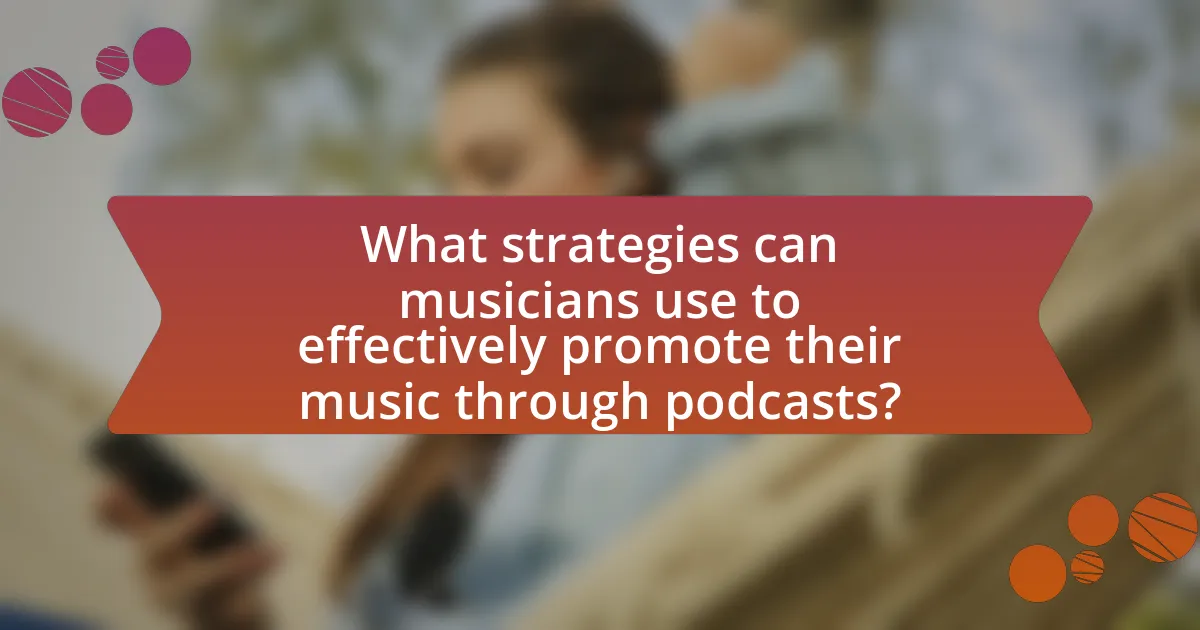
What strategies can musicians use to effectively promote their music through podcasts?
Musicians can effectively promote their music through podcasts by leveraging guest appearances, creating their own podcast, and utilizing social media for cross-promotion. Guest appearances on established podcasts allow musicians to reach new audiences and engage listeners with their music and stories. Creating a dedicated podcast enables musicians to share their creative process, discuss their music, and connect with fans on a deeper level. Additionally, promoting podcast episodes through social media channels can enhance visibility and drive traffic to their music platforms. According to a 2021 report by Edison Research, 41% of Americans aged 12 and older have listened to a podcast in the past month, indicating a growing audience that musicians can tap into for promotion.
How can musicians create engaging podcast content?
Musicians can create engaging podcast content by focusing on storytelling, incorporating music, and inviting guest artists. Storytelling captivates listeners by sharing personal experiences, creative processes, or behind-the-scenes insights, which fosters a deeper connection with the audience. Incorporating music into the podcast, such as playing snippets of songs or discussing the inspiration behind tracks, enhances the auditory experience and keeps listeners engaged. Inviting guest artists not only diversifies content but also attracts their fanbase, expanding the podcast’s reach. According to a 2021 report by Edison Research, 41% of podcast listeners enjoy shows that feature interviews with artists, highlighting the effectiveness of this strategy in engaging audiences.
What types of podcast formats work best for music promotion?
Interview-style podcasts work best for music promotion as they allow artists to share their stories and connect with audiences. This format facilitates in-depth conversations about the artist’s journey, influences, and upcoming projects, creating a personal connection with listeners. According to a study by Edison Research, 54% of podcast listeners are more likely to engage with an artist after hearing them on a podcast, highlighting the effectiveness of this format in building fan relationships. Additionally, curated music shows that feature new tracks and artist interviews can also effectively promote music by providing exposure to a wider audience, as evidenced by the popularity of platforms like Spotify and Apple Music that integrate podcasting with music discovery.
How can storytelling enhance the promotion of music in podcasts?
Storytelling can enhance the promotion of music in podcasts by creating an emotional connection between the audience and the music. This connection is vital as it allows listeners to engage with the music on a deeper level, fostering loyalty and interest. For instance, when a podcast host shares personal anecdotes or the background story of a song or artist, it contextualizes the music, making it more relatable and memorable. Research indicates that narratives can increase information retention by up to 65%, which suggests that storytelling not only captivates listeners but also helps them remember the music being promoted.
What role does collaboration play in podcasting for music promotion?
Collaboration plays a crucial role in podcasting for music promotion by enhancing reach and engagement. When artists collaborate with podcasters, they tap into established audiences, increasing their visibility and potential fan base. For instance, a study by the Interactive Advertising Bureau found that 54% of podcast listeners are more likely to purchase music from artists featured on podcasts. This synergy not only promotes the artist’s music but also enriches the podcast content, creating a mutually beneficial relationship that drives listener interest and loyalty.
How can musicians collaborate with podcasters to reach wider audiences?
Musicians can collaborate with podcasters by featuring their music in podcast episodes, which exposes their work to the podcast’s audience. This collaboration can take various forms, such as interviews where musicians discuss their creative process, live performances during episodes, or exclusive music releases tied to specific podcast themes. According to a 2021 report by Edison Research, 41% of podcast listeners are more likely to discover new music through podcasts, highlighting the effectiveness of this medium for reaching wider audiences. By leveraging the established listener base of popular podcasts, musicians can significantly enhance their visibility and engage with potential fans.
What are the benefits of featuring guest artists on music podcasts?
Featuring guest artists on music podcasts enhances audience engagement and expands listener reach. By inviting well-known or emerging artists, podcasts attract their fan bases, which can significantly increase the number of listeners. For instance, a study by the Podcast Host found that episodes featuring guests often receive 30-50% more downloads compared to solo episodes. Additionally, guest artists provide unique insights and stories, enriching the content and making it more appealing to a diverse audience. This collaboration fosters networking opportunities and can lead to cross-promotion, benefiting both the podcast and the featured artist.
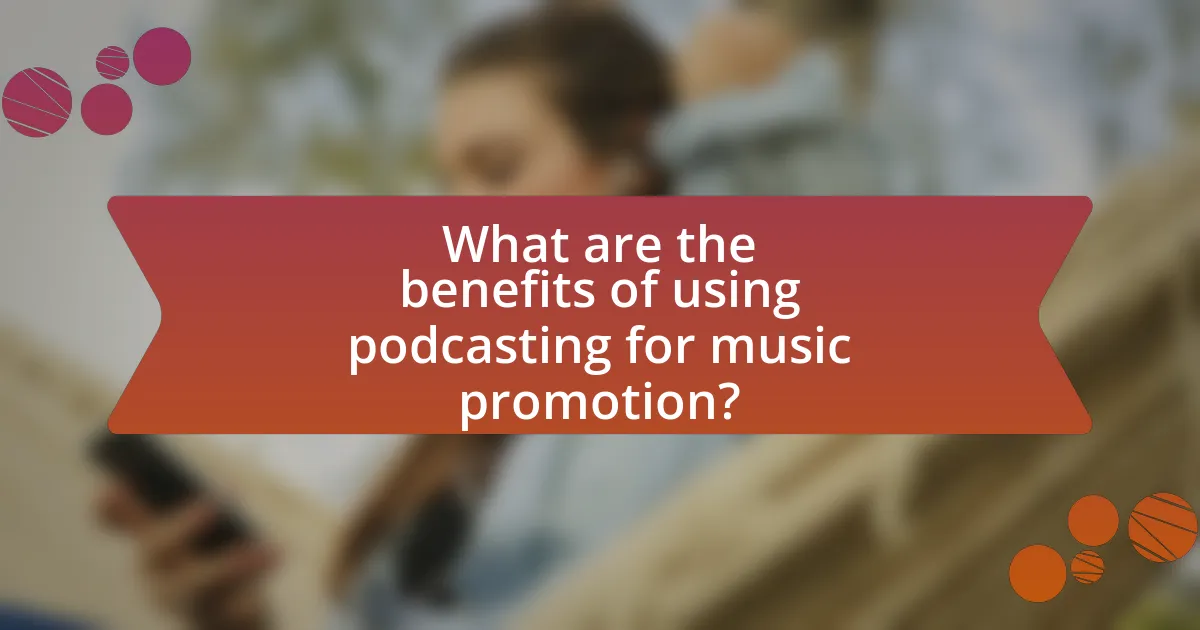
What are the benefits of using podcasting for music promotion?
Podcasting offers several benefits for music promotion, including increased audience engagement, targeted reach, and cost-effectiveness. By creating a podcast, artists can connect with listeners on a personal level, fostering a loyal fan base. Additionally, podcasts allow musicians to reach specific demographics, as they can tailor content to niche audiences interested in particular genres or themes. According to a 2021 report by Edison Research, 41% of Americans aged 12 and older have listened to a podcast in the past month, indicating a growing audience for this medium. Furthermore, producing a podcast can be more affordable than traditional advertising methods, enabling independent artists to promote their music without significant financial investment.
How does podcasting help in building a musician’s brand?
Podcasting helps in building a musician’s brand by providing a platform for direct engagement with fans and showcasing their personality and artistry. Through podcasts, musicians can share their stories, discuss their creative processes, and connect on a personal level, which fosters a loyal fanbase. For instance, a study by Edison Research found that 55% of podcast listeners are more likely to purchase products from brands they hear about on podcasts, indicating that musicians can effectively promote their music and merchandise through this medium. Additionally, podcasts can enhance visibility and credibility, as musicians often collaborate with other artists or industry professionals, further expanding their reach and influence.
What impact does podcasting have on audience loyalty and fan engagement?
Podcasting significantly enhances audience loyalty and fan engagement by creating a personal connection between creators and listeners. This medium allows for in-depth storytelling and consistent content delivery, fostering a sense of community among fans. According to a 2021 report by Edison Research, 54% of podcast listeners feel a stronger connection to brands that engage with them through podcasts, indicating that regular interaction through this format can lead to increased loyalty. Furthermore, the interactive nature of podcasts, such as listener feedback and Q&A sessions, encourages active participation, which strengthens fan engagement.
How can podcasts serve as a platform for direct fan interaction?
Podcasts can serve as a platform for direct fan interaction by facilitating real-time engagement through listener feedback, social media integration, and live Q&A sessions. This interaction allows fans to share their thoughts and questions directly with hosts, creating a sense of community and connection. For instance, many podcasts encourage listeners to submit questions or comments via social media platforms, which are then addressed in episodes, fostering a two-way communication channel. Additionally, live podcast recordings often include audience participation, further enhancing the interactive experience. According to a 2021 survey by Edison Research, 54% of podcast listeners reported feeling a personal connection to the hosts, indicating that podcasts effectively engage fans on a personal level.
What metrics can musicians use to measure the success of their podcasting efforts?
Musicians can measure the success of their podcasting efforts using metrics such as download numbers, listener engagement, audience growth, and social media interactions. Download numbers indicate how many times episodes have been accessed, reflecting overall reach. Listener engagement can be assessed through metrics like average listen duration and listener retention rates, which show how well content holds the audience’s attention. Audience growth is tracked by monitoring subscriber counts and the rate of new listeners over time, providing insight into the podcast’s expanding influence. Social media interactions, including shares, comments, and likes related to podcast episodes, further demonstrate audience interest and engagement. These metrics collectively provide a comprehensive view of a podcast’s performance and its effectiveness as a promotional tool for musicians.
How can download and listen statistics inform promotional strategies?
Download and listen statistics can significantly inform promotional strategies by providing insights into audience preferences and engagement levels. Analyzing these statistics allows marketers to identify which content resonates most with listeners, enabling them to tailor promotional efforts accordingly. For instance, if a particular episode garners high download numbers, it indicates strong interest in that topic or artist, suggesting that similar content could be prioritized in future promotions. Additionally, understanding listener demographics and behavior patterns can help in targeting specific audiences more effectively, optimizing marketing campaigns for better reach and impact.
What role do social media interactions play in assessing podcast success?
Social media interactions are crucial in assessing podcast success as they provide measurable engagement metrics that reflect audience interest and reach. High levels of likes, shares, comments, and mentions on social media platforms indicate a strong connection between the podcast content and its audience, suggesting that the podcast resonates well with listeners. For instance, a study by Edison Research found that 54% of podcast listeners engage with podcasts on social media, highlighting the importance of these interactions in gauging listener loyalty and community building. Additionally, social media can amplify podcast visibility, leading to increased downloads and subscriptions, further solidifying its role as a key indicator of success.
What are some best practices for musicians starting a podcast for promotion?
Musicians starting a podcast for promotion should focus on creating engaging content that resonates with their audience. This involves defining a clear theme that aligns with their music style and interests, ensuring consistency in episode release schedules, and incorporating storytelling to connect emotionally with listeners. Additionally, musicians should leverage social media platforms to promote episodes, engage with fans, and invite guest appearances from other artists or industry professionals to broaden their reach. Research indicates that podcasts with regular guest features can increase listener engagement by up to 30%, enhancing promotional efforts.
How can musicians effectively market their podcasts to attract listeners?
Musicians can effectively market their podcasts to attract listeners by leveraging social media platforms, collaborating with other creators, and optimizing their podcast for search engines. Social media platforms like Instagram, Twitter, and Facebook allow musicians to share snippets, behind-the-scenes content, and engage with their audience, which can significantly increase visibility. Collaborating with other podcasters or musicians can introduce their content to new audiences, enhancing reach. Additionally, optimizing podcast titles, descriptions, and episode content with relevant keywords can improve discoverability on platforms like Apple Podcasts and Spotify, leading to increased listener engagement. According to a study by Edison Research, 55% of podcast listeners discover new shows through social media, highlighting the effectiveness of these marketing strategies.
What common pitfalls should musicians avoid when using podcasts for promotion?
Musicians should avoid several common pitfalls when using podcasts for promotion, including lack of targeted content, insufficient engagement with the audience, and neglecting to promote their music effectively. Focusing on content that does not resonate with the podcast’s audience can lead to disinterest; for instance, musicians should tailor their messages to align with the podcast’s theme and listener demographics. Additionally, failing to engage with listeners through calls to action or social media can result in missed opportunities for building a fan base. Lastly, neglecting to include clear promotional elements, such as links to their music or upcoming shows, can diminish the effectiveness of their promotional efforts. These pitfalls can hinder a musician’s ability to leverage podcasts as a successful promotional tool.
